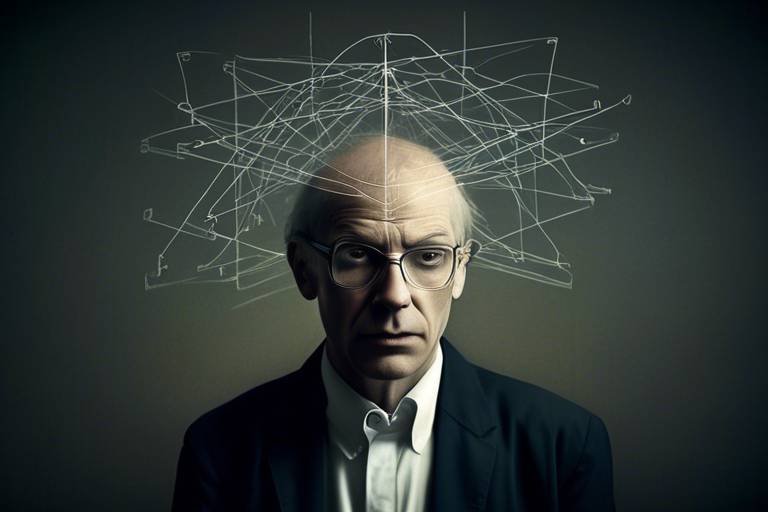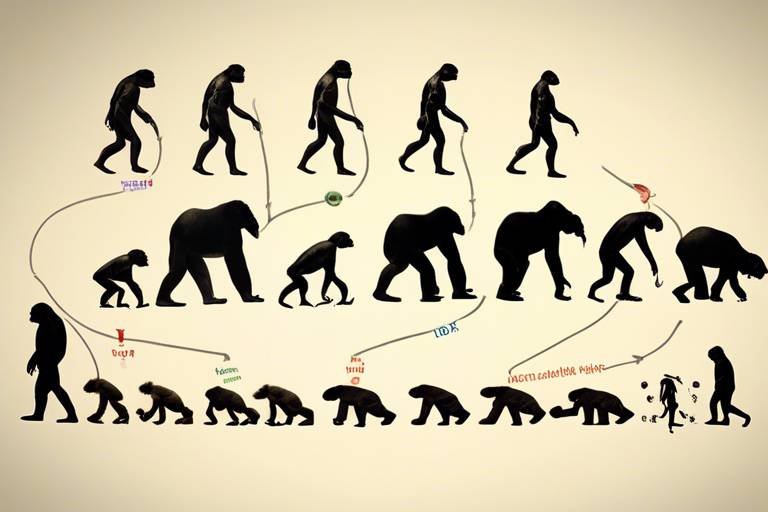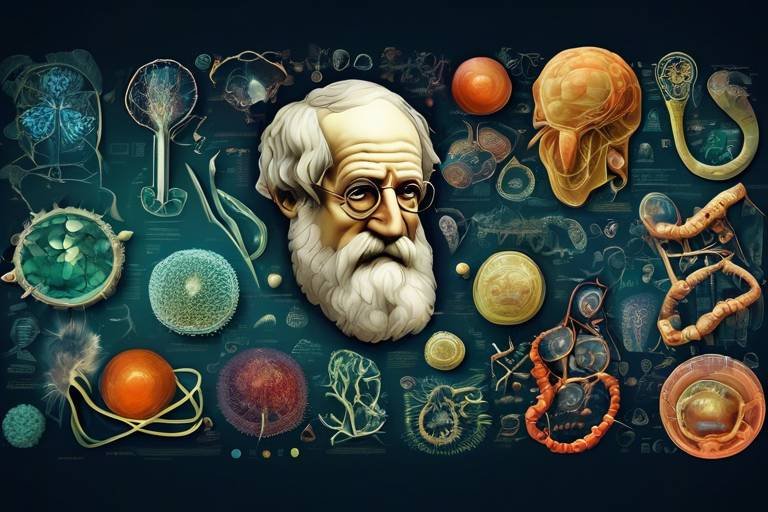The Immaterial Mind - A Debate Between Neurologists and Philosophers
The exploration of consciousness is one of the most captivating and perplexing endeavors in both science and philosophy. As we dive into this intricate discourse, we encounter a rich tapestry of ideas woven by neurologists and philosophers, each bringing their unique perspectives to the table. At the heart of this debate lies the question: What is consciousness, and how does it relate to our very existence? This inquiry is not merely academic; it strikes at the core of what it means to be human. Imagine standing at the edge of a vast ocean, contemplating the depths below. The waves represent our thoughts and feelings, while the abyss symbolizes the unknown nature of consciousness. This article aims to shed light on the ongoing dialogue between these two fields, examining the mind-body problem and its implications for understanding our existence.
Understanding consciousness is fundamental to this debate, as it raises questions about subjective experience and the relationship between mental states and brain activity. What does it mean to be aware? How do we experience thoughts, emotions, and sensations? These questions are not just philosophical musings; they are critical to grasping the nature of our minds. Neurologists often approach this through the lens of brain activity, utilizing advanced imaging techniques to observe how different areas of the brain light up during various mental tasks. On the other hand, philosophers argue that these observations, while enlightening, fail to capture the essence of subjective experience—what it feels like to be 'you' in this moment. This divergence leads us to the mind-body problem, a central theme in our exploration of consciousness.
The mind-body problem examines how mental processes relate to physical states, challenging the perspectives of both neurologists and philosophers in their quest for answers. At its core, this problem questions whether our thoughts and feelings are merely products of brain activity or if they exist independently of the physical substrate. This is where the debate intensifies, as both sides present compelling arguments. Imagine a computer: is the software (our thoughts) separate from the hardware (the brain), or are they fundamentally interconnected? This analogy highlights the complexity of the issue and sets the stage for a deeper examination of dualism versus physicalism.
In the realm of philosophy, dualism posits a separation between mind and body, suggesting that mental phenomena are non-physical and cannot be fully explained by physical processes alone. Proponents of dualism, such as René Descartes, argue that our subjective experiences—like the feeling of love or the taste of chocolate—cannot be reduced to mere brain activity. They emphasize the richness of human experience, asserting that there is more to our consciousness than what can be measured or observed.
Supporters of dualism present several arguments that emphasize the subjective nature of experiences. For instance:
- Qualia: The unique qualities of our experiences, such as the redness of red or the bitterness of coffee, cannot be fully captured by scientific explanations.
- Introspection: Our ability to reflect on our thoughts and emotions suggests a level of consciousness that transcends physical processes.
- Near-Death Experiences: Anecdotal evidence from individuals who have experienced life-threatening situations often describes vivid experiences that challenge purely physical explanations.
Conversely, physicalists argue that all mental states can ultimately be reduced to physical brain states. They contend that advances in neuroscience provide a more scientifically grounded understanding of consciousness. For example, studies have shown correlations between specific brain activity and mental states, suggesting that our thoughts and feelings are products of neural processes. This perspective emphasizes the importance of scientific inquiry in unraveling the mysteries of the mind.
Neuroscience offers critical insights into how brain activity correlates with mental states, prompting further exploration of the implications for our understanding of consciousness. With tools like fMRI and EEG, researchers are uncovering the neural correlates of consciousness, mapping out which areas of the brain are activated during specific thoughts and feelings. This growing body of knowledge challenges us to reconsider our assumptions about the mind and its relationship to the body. If our thoughts are simply the result of neural firing, what does that mean for our understanding of free will and personal responsibility?
Philosophical inquiry into the nature of the mind raises essential questions about free will, identity, and the essence of what it means to be human. These questions are not just theoretical; they have profound implications for how we live our lives and interact with one another. For instance, if our choices are determined by brain activity, can we truly be held accountable for our actions? This leads us to explore the delicate interplay between free will and determinism.
This section delves into the philosophical implications of free will in light of neurological findings. The debate over whether our choices are truly autonomous or predetermined by brain activity is a hotbed of discussion. Imagine a puppet on strings: the strings represent the physical processes in our brains, pulling the strings of our decisions. Are we the puppeteers, or are we simply puppets? This metaphor illustrates the tension between the belief in free will and the deterministic view that our actions are the result of preceding causes.
Philosophers examine the concept of self and personal identity, exploring how consciousness and memory intertwine to shape our understanding of who we are. What constitutes our identity? Is it our memories, our thoughts, or something more elusive? This exploration leads to fascinating questions about the continuity of the self over time. Just as a river flows, constantly changing yet remaining the same body of water, our identities evolve while maintaining a core essence. This analogy helps us grasp the complexity of personal identity in the context of consciousness.
The debate between neurologists and philosophers has significant ethical implications, particularly in areas such as mental health, criminal justice, and moral responsibility. Understanding the nature of the mind influences how we approach these critical issues. For example, if mental states can be traced back to brain activity, how do we address mental health disorders? Should we treat them solely as biological issues, or do we need to consider the philosophical dimensions of human experience?
Understanding the mind's nature influences approaches to mental health treatment, highlighting the importance of integrating philosophical perspectives with neurological findings. A holistic approach that considers both the biological and experiential aspects of mental health can lead to more effective treatment strategies. Imagine a puzzle: each piece represents a different aspect of the mind. To see the complete picture, we must fit together both the neurological and philosophical pieces.
The intersection of neuroscience and philosophy raises questions about moral responsibility, particularly in legal contexts where understanding brain function may affect culpability. If a person's actions are driven by neurological processes beyond their control, should they be held accountable for those actions? This dilemma challenges our traditional notions of justice and morality, urging us to rethink how we define responsibility in light of our growing understanding of the brain.
- What is the mind-body problem? The mind-body problem explores the relationship between mental processes and physical states, questioning how consciousness relates to the brain.
- What are dualism and physicalism? Dualism posits a separation between mind and body, while physicalism argues that mental states can be reduced to physical brain states.
- How does neuroscience contribute to this debate? Neuroscience provides insights into brain activity and mental states, helping to inform our understanding of consciousness.
- What are the ethical implications of this discourse? The debate has significant implications for mental health treatment, criminal justice, and our understanding of moral responsibility.

The Nature of Consciousness
Understanding consciousness is fundamental to this debate, as it raises profound questions about our subjective experiences and the intricate relationship between mental states and brain activity. Have you ever pondered why you feel emotions or how memories are formed? These are not just trivial questions; they strike at the very heart of what it means to be human. Consciousness is often described as the state of being aware of and able to think about one's own existence, sensations, thoughts, and surroundings. But, what does that really entail?
To dive deeper, we must consider the various components of consciousness. It can be broken down into several layers, including:
- Awareness: This is the basic level of consciousness where one is cognizant of their environment and internal states.
- Self-awareness: This is a more advanced stage where individuals recognize themselves as separate entities with their own thoughts and feelings.
- Reflective consciousness: This involves the ability to think about one's own thoughts and experiences, leading to deeper insights and understanding.
The complexity of consciousness is often likened to an intricate tapestry, woven from countless threads of experience, perception, and cognition. Each thread represents a different aspect of our mental life, and together they create the rich fabric of our conscious experience. However, the challenge lies in understanding how these threads intertwine with the physical brain. Are our thoughts and feelings merely the byproducts of neural activity, or do they possess an essence that transcends the physical?
Neurologists seek to unravel these mysteries by studying brain activity through advanced imaging techniques like fMRI and EEG. These tools allow scientists to observe which areas of the brain light up during specific thoughts or feelings, providing a window into the workings of the mind. Yet, despite these technological advancements, the subjective nature of consciousness remains elusive. How can we measure the richness of an individual's experience or the depth of their emotions through mere brain scans? This is where the philosophical inquiries come to play, challenging the very foundations of our understanding.
Philosophers argue that while neuroscience provides valuable insights, it may not fully capture the essence of consciousness. They propose that consciousness is not just a series of neural connections but a profound phenomenon that involves qualitative experiences—what it feels like to be you. This argument is often illustrated through the famous thought experiment known as "Mary's Room," where a scientist knows everything there is to know about color perception but has never seen color herself. When she finally sees red for the first time, she gains new knowledge that goes beyond mere facts. This raises the question: can science ever fully explain the richness of our conscious experience?
In conclusion, the nature of consciousness is a complex interplay between subjective experience and objective brain activity. As we continue to explore this fascinating terrain, we find ourselves at the crossroads of science and philosophy, each offering unique insights that challenge and enrich our understanding of what it means to be conscious. The debate is far from over, and as we learn more, we must remain open to the possibility that consciousness may hold secrets that are yet to be uncovered.

The mind-body problem is one of the most perplexing and enduring questions in both philosophy and neuroscience. It probes into the intricate relationship between our mental processes—thoughts, emotions, and consciousness—and the physical state of our brains and bodies. Imagine your mind as a vibrant orchestra playing a symphony, while your body is the stage where this performance unfolds. The challenge lies in understanding how these two entities, seemingly so distinct, communicate and interact with each other. Are they merely two sides of the same coin, or do they exist in separate realms that influence one another in mysterious ways?
At the heart of this debate is the question of how mental states correlate with physical states. For example, when you feel happiness, what is happening in your brain? Is it just a series of chemical reactions, or is there something more profound at play? Neurologists often emphasize the importance of brain activity in understanding consciousness, suggesting that every thought or feeling can be traced back to specific neural pathways and chemical interactions. This perspective leads to a more scientific approach, aiming to map out how emotions and thoughts correspond to physical brain states.
On the other hand, philosophers argue that reducing mental experiences solely to physical processes overlooks the richness of subjective experience. They contend that feelings of joy, love, or sorrow cannot be completely encapsulated by brain scans or biochemical analyses. To illustrate this, consider the experience of tasting your favorite dessert. While scientists can measure the brain's response to sugar, they cannot fully capture the joy, nostalgia, or even the memories associated with that taste. This raises the question: can we ever truly understand the mind if we only focus on the physical?
To further explore this, let's look at some key perspectives within the mind-body problem:
| Perspective | Description |
|---|---|
| Dualism | Posits that the mind and body are separate entities, each with its own properties. |
| Physicalism | Argues that everything about the mind can be explained by physical processes in the brain. |
| Interactionism | Suggests that the mind and body interact, influencing one another in significant ways. |
| Epiphenomenalism | Claims that mental states are byproducts of physical processes and do not affect physical states. |
As we navigate through these perspectives, it becomes clear that the mind-body problem is not just an academic exercise; it has profound implications for how we understand ourselves as human beings. The implications of this debate stretch into various fields, including psychology, ethics, and even artificial intelligence. If we can decipher the mind-body connection, we might unlock deeper insights into human behavior, emotional well-being, and even the nature of reality itself.
In conclusion, the mind-body problem challenges us to think critically about the essence of consciousness and our existence. As we continue to unravel the complexities of the brain and the mind, we must remain open to the possibilities that lie at the intersection of science and philosophy. After all, understanding ourselves is perhaps the greatest journey we can embark on.

Dualism vs. Physicalism
When diving into the deep waters of the mind-body debate, we encounter two dominant schools of thought: dualism and physicalism. These perspectives offer contrasting views on the relationship between our mental experiences and the physical world, and they each have their own set of implications for understanding consciousness. Imagine dualism as a two-story house where the mind occupies the upper floor, completely separate from the physical body below. This separation suggests that our thoughts, feelings, and consciousness exist independently of our biological makeup. On the other hand, physicalism is like a single-story home where everything is interconnected; it argues that mental states are ultimately reducible to physical processes occurring within the brain.
Proponents of dualism, such as philosopher René Descartes, argue that the subjective nature of experiences—like the feeling of joy or the perception of color—cannot be fully explained by mere physical interactions. They contend that there is something inherently unique about consciousness that defies a purely scientific explanation. For instance, how can we quantify the richness of a sunset or the depth of love through brain chemistry alone? This leads dualists to emphasize the importance of qualia, the individual instances of subjective, conscious experience that seem to elude physical analysis.
Conversely, physicalists maintain that everything we experience mentally can be traced back to physical processes in the brain. They argue that advancements in neuroscience provide compelling evidence that our thoughts and feelings are simply the byproducts of neural activity. For example, studies using brain imaging technology show that specific thoughts or emotions activate particular regions of the brain. This leads to the assertion that understanding these physical mechanisms can eventually unravel the mysteries of consciousness itself. Physicalists often cite the success of the scientific method in explaining complex phenomena as a reason to trust that all aspects of human experience can ultimately be understood through biology.
To further illustrate the differences between these viewpoints, consider the following table:
| Aspect | Dualism | Physicalism |
|---|---|---|
| Definition | Mind and body are distinct entities | Mind is a product of physical processes |
| Key Proponents | René Descartes, Plato | Daniel Dennett, Paul Churchland |
| Focus | Subjective experience and qualia | Neuroscience and brain activity |
| Implications | Potential for non-physical existence | All mental states are reducible to brain states |
While both perspectives offer valuable insights, the debate continues to fuel discussions in both scientific and philosophical circles. Each side raises critical questions that challenge our understanding of what it means to be conscious and how we define our existence. Are we merely biological machines, or is there an immaterial essence that transcends our physical form? This ongoing dialogue not only enriches our understanding of consciousness but also shapes how we approach various fields, from psychology to ethics.
- What is dualism? Dualism is the belief that the mind and body are two distinct entities that interact with each other.
- What is physicalism? Physicalism asserts that everything about the mind can be explained through physical processes and brain activity.
- How do dualism and physicalism differ? Dualism emphasizes the separation of mind and body, while physicalism argues for their unity based on physical phenomena.
- Can both perspectives coexist? Some theorists propose a combination of both views, suggesting that while mental states are rooted in physical processes, they still possess unique qualitative aspects.

Arguments for Dualism
Proponents of dualism argue that the mind and body are fundamentally distinct, emphasizing the subjective nature of human experiences that cannot be entirely explained by physical processes. This perspective suggests that while our brains may control various bodily functions, the essence of consciousness—our thoughts, feelings, and experiences—exists separately from the physical realm. One of the most compelling arguments for dualism is the qualia phenomenon, which refers to the individual instances of subjective, conscious experience. For instance, consider the way you perceive the color red; this experience is deeply personal and cannot be fully conveyed through a scientific explanation of light wavelengths.
Furthermore, dualists often point to cases of near-death experiences and out-of-body experiences as evidence that consciousness can exist independently of the physical body. In these instances, individuals report vivid, conscious experiences that occur while their bodies are incapacitated or even clinically dead. Such accounts challenge the notion that consciousness is merely a byproduct of brain activity, suggesting instead that there is an immaterial aspect of our being that transcends physical limitations.
Another significant argument for dualism is the concept of free will. If our thoughts and decisions are entirely dictated by physical processes, then the notion of free will becomes questionable. Dualists argue that our ability to make choices stems from a non-physical mind that interacts with the physical body. This perspective resonates with many people's intuitive understanding of self-agency, as it aligns with the feeling that we are not just biological machines acting on predetermined impulses but rather conscious beings capable of making independent decisions.
Moreover, dualism raises profound questions about personal identity. If the mind is separate from the body, then what happens to our consciousness after death? This inquiry not only fuels philosophical debates but also inspires various cultural and religious beliefs about the afterlife. The idea that our consciousness may persist beyond physical existence offers comfort to many and underscores the significance of the mind as more than just a collection of neural connections.
In summary, dualism presents a compelling framework that emphasizes the unique qualities of human consciousness. By acknowledging the subjective nature of experiences, the possibility of free will, and the implications for personal identity, dualists argue for a more nuanced understanding of the mind-body relationship. While the scientific community continues to explore the intricacies of brain function, the dualist perspective invites us to consider the profound mysteries of our existence that may lie beyond the realm of empirical investigation.
- What is dualism? Dualism is the philosophical position that the mind and body are fundamentally different entities, with the mind existing independently of the physical brain.
- What are qualia? Qualia are the subjective, individual experiences of perception, such as the taste of chocolate or the experience of seeing the color red.
- How does dualism relate to free will? Dualism posits that if the mind is separate from the body, then individuals have the capacity for free will, allowing them to make choices independent of purely physical processes.
- What implications does dualism have for personal identity? Dualism raises questions about what happens to the mind after death, suggesting that consciousness may persist beyond physical existence.

Arguments for Physicalism
Physicalism, a perspective that has gained substantial traction in both scientific and philosophical circles, posits that everything about the mind can ultimately be explained through physical processes. This view is compelling because it aligns with the advancements in neuroscience, which increasingly demonstrate that mental states correlate with brain states. Imagine your brain as a complex orchestra, where each instrument represents a different neuron or group of neurons. Just as a symphony arises from the harmonious interplay of these instruments, our thoughts, feelings, and perceptions emerge from the intricate interactions of physical brain processes.
One of the strongest arguments for physicalism is the success of neuroscience in mapping the brain's activities to specific mental states. For instance, when you experience joy, certain areas of your brain light up in response to stimuli, and through neuroimaging techniques like fMRI, we can observe these patterns. This correlation suggests that our emotional experiences are not separate from our physical being but are deeply rooted in our brain's structure and function. Furthermore, consider how physical injuries to the brain can lead to profound changes in personality or cognitive abilities. This phenomenon reinforces the idea that our mental experiences are intimately connected to our physical state.
Moreover, physicalism offers a more scientifically grounded understanding of consciousness. By focusing on observable phenomena, it encourages a rigorous investigation into the nature of the mind. For example, researchers are exploring how neurotransmitters and brain chemistry influence our thoughts and behaviors. This approach not only demystifies mental processes but also opens avenues for effective treatments for mental health issues.
Critics of dualism often point out that it struggles to explain how two fundamentally different substances—the mental and the physical—interact. In contrast, physicalism provides a cohesive framework where everything can be understood through the lens of physical laws. This is akin to how the laws of physics govern everything from the motion of planets to the behavior of subatomic particles. The elegance of physicalism lies in its ability to unify our understanding of the universe, including the human mind.
In summary, the arguments for physicalism emphasize:
- The correlation between brain activity and mental states, illustrated by advancements in neuroscience.
- The ability of physicalism to provide a coherent explanation of consciousness without the complications of dualism.
- The implications for mental health treatment, which can be grounded in a better understanding of brain function.
Ultimately, the debate between physicalism and dualism continues to be a rich field of inquiry. As we delve deeper into the mysteries of the mind, physicalism stands as a strong contender, offering a perspective that is not only scientifically robust but also deeply relevant to our understanding of what it means to be human.
- What is physicalism? Physicalism is the philosophical viewpoint that everything about the mind can be explained through physical processes and brain activity.
- How does neuroscience support physicalism? Neuroscience provides evidence that mental states correlate with brain activity, demonstrating that our thoughts and feelings are rooted in physical processes.
- What are the implications of physicalism for mental health? Understanding the mind as a product of physical processes can lead to more effective treatments for mental health issues by focusing on brain function.
- Why is physicalism preferred over dualism? Physicalism avoids the complexities of explaining how two different substances interact, providing a more cohesive and scientifically grounded understanding of consciousness.

Neuroscience Insights
Neuroscience has made remarkable strides in unraveling the complexities of the human brain, providing us with critical insights into the intricate relationship between brain activity and mental states. As we delve deeper into the neural mechanisms underlying consciousness, we begin to understand how our thoughts, emotions, and perceptions are intricately woven into the fabric of our biological existence. For instance, advancements in neuroimaging techniques, such as functional magnetic resonance imaging (fMRI) and electroencephalography (EEG), have allowed researchers to visualize brain activity in real-time, shedding light on how different areas of the brain engage during various cognitive tasks.
One fascinating aspect of neuroscience is the discovery of specific brain regions associated with distinct mental processes. For example, the prefrontal cortex is often linked to decision-making and social behavior, while the amygdala plays a crucial role in processing emotions like fear and pleasure. These findings challenge the traditional notion that consciousness is a singular experience, suggesting instead that it is a dynamic interplay of multiple systems working together. This raises a compelling question: if our consciousness is so intricately tied to our brain's physical structure, can we truly separate the two?
Moreover, neuroscience has revealed the plasticity of the brain—its ability to adapt and reorganize itself in response to learning and experience. This concept of neuroplasticity not only underscores the brain's remarkable capacity for growth but also hints at the potential for altering our mental states through targeted interventions. For instance, therapies that focus on cognitive restructuring or mindfulness practices can lead to observable changes in brain function, illustrating the profound connection between our thoughts and our neural architecture.
As we explore these insights, it becomes evident that neuroscience does not operate in a vacuum. The interplay between neurological findings and philosophical questions about consciousness prompts a deeper inquiry into the nature of our existence. For instance, consider the implications of brain injuries or neurological disorders that alter an individual's personality or sense of self. How do these changes affect our understanding of personal identity? Such inquiries invite a rich dialogue between neurologists and philosophers, each contributing unique perspectives to the ongoing debate about what it means to be human.
To summarize, the insights gained from neuroscience not only enhance our understanding of consciousness but also challenge us to reconsider fundamental questions about the mind-body relationship. As we continue to uncover the mysteries of the brain, we must remain open to the philosophical implications of these discoveries, recognizing that the journey toward understanding the immaterial mind is as much about science as it is about the essence of human experience.
- What is the primary focus of neuroscience in relation to consciousness? Neuroscience primarily focuses on understanding how brain activity correlates with mental states and how this relationship shapes our experiences and behaviors.
- How does neuroplasticity influence our mental health? Neuroplasticity allows the brain to adapt and reorganize itself, which can help in recovery from injuries or in the treatment of mental health disorders through various therapeutic interventions.
- What role do philosophers play in the discussion of consciousness? Philosophers contribute to the discourse by exploring the implications of neurological findings on concepts such as free will, identity, and the nature of consciousness itself.

Philosophical Perspectives
The exploration of consciousness is not solely a scientific endeavor; it is deeply intertwined with philosophical inquiry. Philosophers have long pondered the nature of the mind, delving into questions that challenge our understanding of free will, identity, and what it means to be human. At the heart of these discussions is the notion that consciousness may not just be a byproduct of brain activity, but rather a fundamental aspect of our existence that shapes our experiences and interactions with the world.
One of the most intriguing aspects of this philosophical exploration is the concept of free will. Are our choices truly our own, or are they merely the result of predetermined brain processes? This question invites us to consider the implications of neurological findings that suggest our decisions may be influenced by subconscious brain activity before we even become aware of them. For instance, studies have shown that brain activity can predict a person's choice seconds before they consciously make it. This raises profound questions about our autonomy and whether we can be held morally responsible for our actions.
Moreover, the debate extends to the idea of personal identity. Philosophers argue that our sense of self is intricately linked to our consciousness and memory. If our memories are altered or erased, how does that affect our identity? Are we still the same person if our experiences are lost? This inquiry leads to fascinating discussions about the continuity of self and the role that consciousness plays in defining who we are. The interplay between memory and consciousness is crucial in understanding the essence of identity, as it shapes our perceptions, beliefs, and relationships.
As we navigate these philosophical waters, it's essential to recognize the implications of these discussions on our everyday lives. The way we perceive free will and identity influences our interactions with others, our understanding of justice, and our approach to mental health. For instance, if we accept that our choices are influenced by neurological processes, we might adopt a more compassionate view towards those struggling with mental health issues, recognizing that their experiences are not merely a matter of willpower but are deeply rooted in their biology.
In summary, the philosophical perspectives on consciousness, free will, and identity offer a rich tapestry of ideas that challenge our understanding of what it means to be human. As we continue to explore these concepts, we must remain open to the interplay between philosophy and neuroscience, as each field offers valuable insights that can enhance our grasp of the human experience.
- What is the mind-body problem? The mind-body problem explores the relationship between mental processes and physical states, questioning how our thoughts and feelings relate to our brain activity.
- How do philosophers view free will? Philosophers debate whether free will truly exists or if our choices are determined by neurological factors, raising questions about moral responsibility.
- What role does consciousness play in identity? Consciousness is seen as a key component of personal identity, as it shapes our memories and experiences, contributing to our understanding of who we are.
- How can neuroscience inform ethical considerations? Insights from neuroscience can influence our approaches to mental health treatment and our understanding of culpability in legal contexts.

Free Will and Determinism
The tension between free will and determinism is one of the most captivating philosophical debates, especially when we consider the implications of recent neurological discoveries. At its core, this discussion revolves around a fundamental question: Are we truly the architects of our choices, or are our decisions merely the product of predetermined brain activity? Imagine standing at a crossroads, with one path leading to a world where every choice is yours to make, and the other leading to a universe where your actions are scripted by the laws of physics. Which road would you choose?
Determinism suggests that every event, including our thoughts and actions, is the result of preceding events and conditions. In this view, the universe operates like a grand machine, where every cog and gear is set in motion by prior circumstances. For instance, if we consider a simple decision like choosing what to eat for breakfast, a deterministic perspective would argue that this choice is influenced by a myriad of factors—your mood, past experiences, biological needs, and even cultural conditioning. Essentially, every decision can be traced back to a chain of cause and effect, leaving little room for the notion of free will.
On the other hand, proponents of free will argue that humans possess the ability to make choices independent of external influences. They believe that while our decisions may be influenced by our biology and environment, we still hold the power to choose differently. This perspective is often illustrated through the concept of moral responsibility: if we are not in control of our choices, can we truly be held accountable for our actions? For example, if a person commits a crime due to uncontrollable impulses triggered by neurological conditions, should they face the same consequences as someone who made a conscious choice?
As we delve deeper into this debate, it becomes apparent that the intersection of neuroscience and philosophy complicates matters. Neurological studies have shown that brain activity related to decision-making occurs before we are consciously aware of our choices. This raises alarming questions about the nature of our autonomy. Are we simply following a script written by our brains, or is there still room for genuine choice?
To illustrate this complexity, consider the following table that contrasts key aspects of free will and determinism:
| Aspect | Free Will | Determinism |
|---|---|---|
| Choice | Individuals can make independent choices. | Choices are influenced by prior events. |
| Moral Responsibility | People are accountable for their actions. | Accountability is diminished if choices are predetermined. |
| Influence of Biology | Biological factors can be overridden. | Biological factors dictate choices. |
This ongoing debate not only challenges our understanding of the mind but also has profound implications for how we view ourselves and our society. If we lean towards determinism, we might reconsider how we handle issues like criminal justice and mental health. Understanding that individuals may not have full control over their actions could lead to more humane approaches in these areas. Conversely, if we embrace free will, we may continue to uphold traditional views of accountability and moral responsibility.
Ultimately, the question of free will versus determinism is not just a philosophical exercise; it's a reflection of our very identity. Do we see ourselves as empowered beings capable of making choices, or as players in a game where the outcomes are already determined? This debate invites us to explore the depths of human existence and consider what it truly means to be alive and conscious.
- What is free will? Free will is the ability to make choices that are not determined by prior causes or external factors.
- What is determinism? Determinism is the philosophical view that all events, including human actions, are ultimately determined by causes external to the will.
- Can free will and determinism coexist? Some philosophers argue for compatibilism, which suggests that free will and determinism can coexist, allowing for moral responsibility within a deterministic framework.
- How do neurological studies impact the debate? Neurological studies indicate that brain activity related to decisions can occur before conscious awareness, challenging traditional notions of free will.

Identity and the Self
When we dive into the concept of identity and the self, we enter a fascinating realm where philosophy meets psychology. It's like peeling an onion—each layer reveals deeper questions about who we are and what makes us unique. Have you ever looked in the mirror and wondered, “Who is that person staring back at me?” This simple question opens up a Pandora's box of thoughts about consciousness, memory, and personal identity.
Philosophers have long debated whether our identity is tied to our physical body or if it exists independently in our consciousness. This brings us to a key point: is our identity static, or does it evolve over time? Imagine your life as a river. As you flow through experiences, your identity shifts and changes, shaped by the currents of your memories, emotions, and interactions. This metaphor illustrates the dynamic nature of self—constantly in flux yet rooted in a core essence.
One significant aspect of this discussion is the role of memory. Memory is often considered the bedrock of personal identity. Without memories, who would we be? Consider this: if you could erase all your memories, would you still be the same person? Philosophers like John Locke argued that memory is crucial for personal identity, suggesting that we are essentially the sum of our experiences. On the other hand, some argue that our identity transcends memory, hinting at a deeper, perhaps more spiritual connection to the self.
To better understand these ideas, let's look at some key philosophical perspectives:
- Lockean Theory: This perspective emphasizes the importance of consciousness and memory in defining personal identity.
- Physicalism: This view posits that identity is tied to the physical brain and its processes, suggesting that changes in the brain can alter who we are.
- Psychological Continuity: This theory suggests that as long as there is a psychological connection—such as memories or personality traits—between past and present selves, identity remains intact.
These perspectives highlight the complexity of defining the self. Are we merely a collection of memories and experiences, or is there something more profound at play? This question leads us to consider the implications of identity in our daily lives. For instance, how do our identities influence our decisions, relationships, and even our mental health? Understanding the self can empower us to navigate life's challenges with greater clarity and purpose.
In summary, the exploration of identity and the self is a rich tapestry woven from threads of memory, consciousness, and philosophical inquiry. As we continue to unravel these threads, we gain deeper insights into what it truly means to be human. So, the next time you ponder your identity, remember that it's not just about who you are today, but also about the journey that has shaped you into the person you are becoming.
- What is personal identity? Personal identity refers to the concept of what makes one individual distinct from others, often involving continuity of consciousness and memory.
- How do memories affect our identity? Memories play a crucial role in shaping our identity as they form the narrative of our experiences and influence our behavior and choices.
- Can identity change over time? Yes, identity can change as we accumulate new experiences, learn, and grow, much like a river flowing and adapting to its environment.

Implications for Ethics
The ongoing debate between neurologists and philosophers about the nature of consciousness and the mind-body problem extends beyond mere academic inquiry; it has profound implications for ethics. As we delve deeper into understanding how our minds work, we begin to confront critical questions about mental health, criminal justice, and moral responsibility. These areas are not just theoretical; they affect real lives and societal norms. For instance, when we consider mental health, the distinction between neurological conditions and psychological experiences becomes crucial. If our thoughts and actions are significantly influenced by brain chemistry, how do we hold individuals accountable for their actions? This question can lead us to rethink our approach to treatment and rehabilitation.
Moreover, the intersection of neuroscience and ethics raises significant questions about moral responsibility. If our decisions are heavily influenced by biological factors, can we genuinely claim that we possess free will? This dilemma is particularly poignant in legal contexts. Imagine a scenario where a person commits a crime but has a documented history of neurological issues that impair their judgment. Should the legal system consider these factors when determining culpability? In such cases, the lines between guilt and innocence blur, leading to a need for a more nuanced understanding of accountability.
To illustrate this point further, let's look at some key areas where the implications of the mind-body debate manifest:
| Area | Ethical Implications |
|---|---|
| Mental Health | Integration of neurological insights into treatment approaches; understanding mental illness as a complex interplay between brain and environment. |
| Criminal Justice | Rethinking responsibility and punishment; potential for rehabilitation over retribution based on understanding of brain function. |
| Personal Responsibility | Debates on free will; implications for moral judgments and societal norms regarding accountability. |
These discussions are not merely academic; they resonate with our everyday experiences and influence the way we view ourselves and others. As we continue to explore the depths of human consciousness, the ethical ramifications become increasingly significant. It challenges us to reassess our definitions of right and wrong, responsibility, and what it means to be human. The implications are vast and demand a collaborative approach that incorporates both neurological findings and philosophical reasoning.
In summary, the implications for ethics arising from the debate between neurologists and philosophers are vast and complex. They compel us to reconsider how we approach issues of mental health, criminal justice, and personal responsibility. As we strive for a deeper understanding of the mind, we must also be prepared to navigate the ethical landscapes that emerge from our newfound knowledge.
- What is the mind-body problem? The mind-body problem explores the relationship between mental processes and physical states, questioning how consciousness relates to brain activity.
- How does neuroscience impact our understanding of ethics? Neuroscience provides insights into how brain function influences behavior, which can reshape our views on moral responsibility and treatment approaches.
- What are the implications of dualism and physicalism for ethics? Dualism suggests a separation of mind and body, which can lead to different ethical considerations compared to physicalism, which views mental states as rooted in physical processes.
- Why is free will a significant issue in this debate? Free will is crucial because it impacts how we assign moral responsibility; if our choices are predetermined by neurological factors, our understanding of accountability may change.

Mental Health Considerations
The exploration of the mind's nature has profound implications for mental health treatment. As we dive deeper into the interplay between neurological findings and philosophical perspectives, it becomes increasingly clear that understanding consciousness is not just an academic exercise—it's a matter of real-world significance. When we consider mental health, we must ask ourselves: how do our beliefs about the mind influence our approaches to treatment? Are we merely treating symptoms, or are we addressing the underlying essence of what it means to be mentally healthy?
In recent years, there's been a growing recognition that mental health cannot be fully understood through a purely biological lens. While neurological research provides invaluable insights into brain function and its correlation with mental states, it often overlooks the subjective experiences that define our emotional lives. For instance, a patient suffering from depression may exhibit distinct brain activity patterns, but this does not capture the full scope of their experience—the feelings of despair, hopelessness, and disconnection that accompany such a condition.
To illustrate this point, consider the following table that outlines the differences between traditional neurological approaches and more holistic, philosophical perspectives on mental health:
| Approach | Focus | Implications for Treatment |
|---|---|---|
| Neurological | Brain function and chemistry | Medication and symptom management |
| Philosophical | Subjective experience and meaning | Therapeutic dialogue and existential exploration |
This table highlights a crucial dichotomy in mental health treatment. While neurological approaches tend to focus on the biological underpinnings of mental illness, philosophical perspectives encourage a more nuanced understanding that includes the patient's lived experience. This is where the integration of both viewpoints becomes essential. For instance, cognitive-behavioral therapy (CBT) incorporates elements of both by addressing distorted thinking patterns while also considering the emotional context in which these thoughts arise.
Moreover, the stigma surrounding mental health often stems from misunderstandings about the nature of consciousness itself. If we view mental health issues solely through a neurological lens, we might inadvertently contribute to the perception that those suffering are simply "broken" or "defective." However, by embracing a more comprehensive view that includes both neurological and philosophical insights, we can foster a greater sense of empathy and understanding for those facing mental health challenges.
Ultimately, the dialogue between neurologists and philosophers is not just an academic debate; it has real-world implications for how we treat individuals struggling with mental health issues. By bridging the gap between these two fields, we can create more effective, compassionate approaches to mental health care that honor both the biological and experiential aspects of human existence.
- What is the mind-body problem? The mind-body problem is a philosophical question about how mental processes relate to physical states, particularly how consciousness arises from brain activity.
- How does neuroscience contribute to our understanding of mental health? Neuroscience provides insights into brain function and its correlation with mental states, helping us understand the biological aspects of mental health conditions.
- Why is it important to integrate philosophical perspectives in mental health treatment? Integrating philosophical perspectives allows for a more holistic approach that considers the subjective experiences of individuals, fostering empathy and understanding in treatment.

Criminal Responsibility
The intersection of neuroscience and philosophy brings to light profound questions regarding . As we delve into the complexities of the human mind, we must ask ourselves: if our thoughts and actions are influenced by neurological processes, to what extent can we hold individuals accountable for their behavior? This dilemma is at the heart of many legal discussions today, as advancements in neuroscience challenge traditional notions of free will and moral culpability.
Consider the implications of a brain scan revealing abnormal activity in the areas associated with impulse control and decision-making. If a person commits a crime, and it can be shown that their brain function deviated from what is considered typical, can we still deem them fully responsible for their actions? This question is not merely academic; it has real-world consequences in courtrooms, where juries must grapple with the balance between understanding a defendant's mental state and upholding justice.
Philosophers argue that the concept of moral responsibility hinges on the ability to make choices freely. If neurological evidence suggests that a person's capacity for decision-making was compromised, then their culpability could be called into question. This leads to a spectrum of responsibility, where individuals might be seen as less culpable due to their mental conditions. For example, a defendant diagnosed with a severe mental illness may receive a different verdict than one who is deemed fully aware of their actions.
In the legal system, this raises the need for a nuanced understanding of mental health and its implications for justice. Courts are increasingly considering psychological evaluations and neurological assessments when determining sentencing or rehabilitation options. For instance, a table summarizing how different mental health conditions can influence criminal responsibility could look like this:
| Mental Health Condition | Potential Impact on Responsibility |
|---|---|
| Severe Depression | May impair judgment and decision-making capabilities. |
| Bipolar Disorder | Manic episodes can lead to impulsive behavior. |
| Schizophrenia | Delusions may distort reality, affecting intent. |
As we navigate these murky waters, it becomes essential to foster a dialogue between neuroscientists and legal professionals. The goal is to create a more informed legal framework that recognizes the complexities of the human brain while still upholding the principles of justice. After all, the ultimate aim is not only to punish but also to understand and rehabilitate. This ongoing discussion about and the role of neuroscience in the legal system is not just an academic exercise; it has the potential to reshape how we view justice in a rapidly evolving world.
- What is the relationship between neuroscience and criminal responsibility? Neuroscience studies the brain's role in behavior, which can affect how we understand an individual's responsibility for their actions.
- Can a mental illness exempt someone from criminal responsibility? Yes, depending on the severity and nature of the condition, it can influence legal outcomes regarding culpability.
- How do courts consider neurological evidence? Courts may use neurological assessments to determine the mental state of a defendant at the time of the crime, influencing sentencing and rehabilitation.
Frequently Asked Questions
- What is the nature of consciousness?
Consciousness is often described as the state of being aware of and able to think about one's own existence, thoughts, and surroundings. It's a complex phenomenon that raises questions about subjective experiences and how they relate to brain activity. Understanding consciousness is crucial in the debate between neurologists and philosophers.
- What is the mind-body problem?
The mind-body problem explores how mental processes, such as thoughts and emotions, relate to physical states of the brain and body. This dilemma challenges both neurologists and philosophers to find a cohesive understanding of how our mental and physical selves interact.
- What are dualism and physicalism?
Dualism is the belief that the mind and body are distinct entities, while physicalism argues that everything about the mind can be explained through physical processes in the brain. These opposing views shape much of the discourse surrounding consciousness and human existence.
- What arguments support dualism?
Proponents of dualism argue that certain subjective experiences, like emotions and thoughts, cannot be fully explained by physical processes alone. They emphasize the richness of human experience that seems to transcend mere biological functions.
- What do physicalists argue?
Physicalists contend that all mental states can ultimately be reduced to physical states in the brain. They believe that scientific advancements will eventually provide a comprehensive understanding of consciousness through the lens of neuroscience.
- How does neuroscience contribute to this debate?
Neuroscience offers insights into how brain activity correlates with various mental states. By examining brain function and structure, it helps to illuminate the biological underpinnings of consciousness, prompting further philosophical inquiry.
- What are the philosophical implications of free will?
The philosophical implications of free will center around whether our choices are genuinely autonomous or if they are predetermined by neurological processes. This question challenges our understanding of moral responsibility and personal agency.
- How do identity and consciousness relate?
Philosophers explore how consciousness and memory shape our sense of self and personal identity. This relationship is crucial in understanding who we are and how we perceive our existence over time.
- What are the ethical implications of the debate?
The discussions between neurologists and philosophers have significant ethical implications, particularly in mental health treatment, criminal justice, and moral responsibility. These insights can influence how we approach issues like mental illness and culpability in legal contexts.
- How does this debate affect mental health treatment?
Understanding the nature of the mind can significantly influence mental health treatment approaches. Integrating philosophical perspectives with neurological findings can lead to more effective and holistic treatment strategies.
- What questions arise about criminal responsibility?
The intersection of neuroscience and philosophy raises questions about moral responsibility, especially in legal contexts. Understanding brain function can impact how we view culpability and accountability in criminal behavior.



















